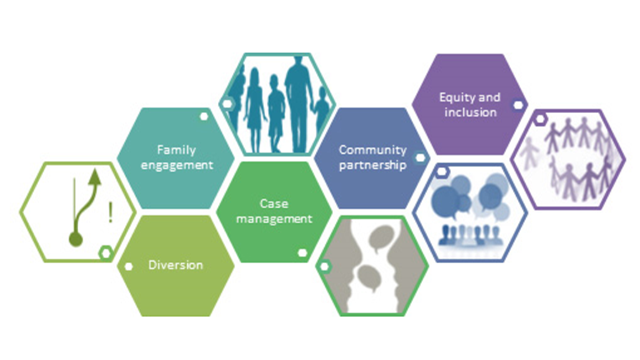To recognize Second Chance Month and its focus on outreach to prisoners and their families, we want to highlight some of the work Mathematica is doing on reentry opportunities for people involved with the justice system. We work with federal, state, and local agencies and leverage innovative methods to provide information on the effectiveness of reentry programs and policies.
First look at Oakland Unite’s strategies to reduce violence
A new report evaluates the effect of participating in life coaching, employment, and education support on short-term arrest rates. Oakland Unite is a publicly funded initiative in Oakland, California, that invests in community-based violence prevention programs. The report examines two of the program’s substrategies—adult life coaching and adult employment and education support services. Both strategies showed some positive impacts on arrests for violent offenses in the six months following enrollment. Future reports will examine the other Oakland Unite substrategies, including youth life coaching, youth employment and education support services, street outreach, shooting response, and intervention for commercially sexually exploited children.
Blog discusses using network analysis to understand how providers can work together
In Hidden Connections: Exploring Partnerships Through Network Analysis, Naihobe Gonzalez discusses using network analysis to understand how agencies with violence prevention strategies and reentry service providers work together to prevent violence in Oakland. This method, which can be used to better understand the bigger picture of how different agencies form an interconnected system of services, served to visualize how the program’s agencies collaborate.
Colorado Department of Corrections reentry systems mapping
The Colorado Evaluation and Action Lab (“Colorado Lab”) partners with the Office of Colorado’s Governor and works with state agencies to improve the lives of Colorado’s residents. This year, Mathematica is supporting the Colorado Lab in their partnership with the Colorado Department of Corrections to examine and document pre- and post-release services provided to formerly incarcerated individuals in Colorado and the frequency of recidivism for those who receive reentry support. The project team will generate measures of program contact for reentry services, conduct a descriptive analysis of reentry service receipt, and provide a landscape summary of how existing Colorado policies are implemented. The study will conclude with recommendations for future research, laying the foundation for future rigorous studies of the impact of specific transition services on recidivism.
Project spotlight: Examining federal investments in employment opportunities for youth and adults
We are evaluating the Reentry Employment Opportunities program, an initiative of the U.S. Department of Labor. The program’s objective is to improve employment outcomes and workforce readiness for people with prior justice involvement through employment services, case management, and other supportive services, including legal services. We are examining the evidence about effective strategies and approaches implemented by the program.
Project spotlight: Linking to Employment Activities Pre-Release and facilitating connections
This ambitious initiative examines models to strengthen ties between the public workforce system and local correctional facilities by establishing satellite American Job Centers in local jails. The program facilitates the transition of people who are released from jail to ensure they continue to receive services at community American Job Centers. With our partner, Social Policy Research Associates, we are evaluating the implementation of the 20 grantees’ programs to document how the programs operate, what services they provide, what participants they serve, and the short-term outcomes of participants upon release.
Learn more about justice research and analytics at Mathematica.

